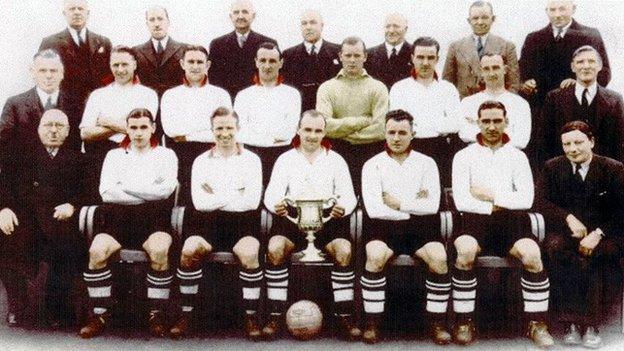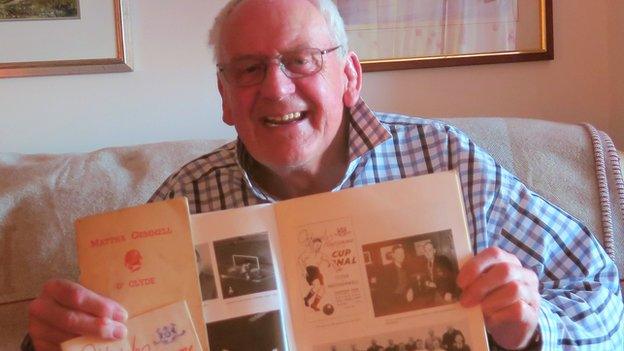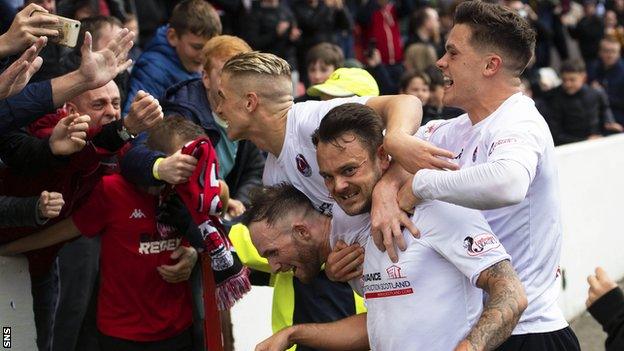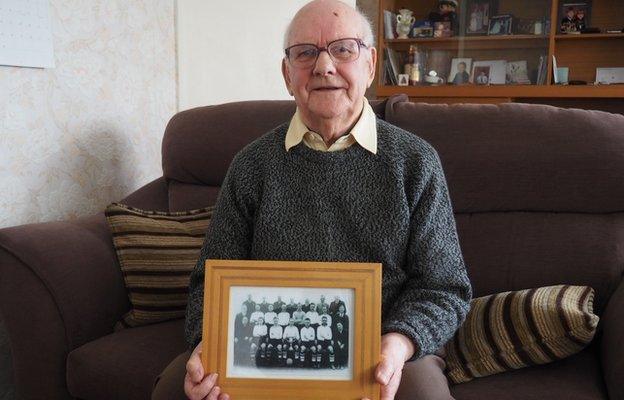Scottish Cup final: 80th anniversary for Clyde side that held the trophy longest
- Published

Clyde won the Scottish Cup for the first time in 1939
Celtic secured a record-equalling third Scottish Cup final victory in a row by beating Hearts on Saturday, but they have a long way to go before being able to boast that they are holders of the trophy for the longest-ever period of time.
Rangers (on three occasions), Queen's Park (twice), Aberdeen and Vale of Leven have also all lifted the world's oldest national trophy three times in succession.
But Clyde have the honour of having it in their trophy cabinet the longest - for eight years thanks to the Second World War forcing the competition to be put on ice from 1939 to 1946.
The 80th anniversary of the Bully Wee's 4-0 victory over Motherwell has been overshadowed by their promotion to Scotland's League One thanks to Saturday's play-off win over Annan Athletic.
But it stirred many happy memories for former Scotland rugby forward Peter Brown and life-long Clyde fan Robert Thomson, who was there that historic day.
Burning effigy, Arsenal transfer and saves with a bunnet

Former Scotland rugby international Peter Brown is proud of his father's Clyde memorabilia
Brown wasn't born until two years after the landmark final, but he knows all about events before, during and after the game thanks to his father.
Jock Brown was in goal on 24 April 1939 as Clyde won the cup for the first time in their history in front of 94,000 fans at Hampden Park.
"When Alzheimers had struck, we used to take him back there because his memory was perfect for the 30s and 40s," Peter explains.
Jock was instrumental not only in winning the final but in getting them there as St Johnstone, Dundee, Rangers, Third Lanark and Hibernian were all despatched with the loss of only one goal.
"He was famous for saving penalties and he used to keep a record of where the penalty kick taker put it when it was a crucial penalty," Peter recalls. "He used to say, if it didn't matter, they could just hit it anywhere, but if it really mattered, they always aimed for their favourite spot.
"His phrase was 'I used to lie in wait to catch it in my bunnet'. However, against Rangers, Bob McPhail, their usual penalty taker, teed the ball up on the spot, stood back and 'another player came and kicked it'."
He reckons his father was ahead of his time. "My father was renowned for coming out of his goal and narrowing the angles and, when wingers got the ball, he was always willing them to cross it, because anything in the box was his."
That prowess was tested to the full as favourites Motherwell used the strong wind to their advantage. "They were all over Clyde for the first half hour, but father had a lot of good saves," Peter says.

Ally Love's winner against Annan secured promotion for the current Clyde side on Saturday
Dougie Wallace smashed home from a Tom Robertson cross against the run of play, that settled Clyde and the Glasgow side, managed by Irishman Paddy Travers, went on to secure a convincing victory.
It was sweet revenge for Clyde, having lost 4-1 to Motherwell in the first round the previous season - and redemption for Brown, the goalkeeper having been blamed for a previous error.
"When they won the cup and they were going out in the open-top bus, father's inside and they were saying 'come on Jock, are you not going out on the top of the bus? And he said 'not likely, they burnt an effigy of me here last year'," his son recalls.
Along with a Scottish Cup winners medal came a proposed transfer "to Arsenal for an all-time British record fee just before war broke out and that put the capers on that".
Not one of Clyde's cup-winning team remained with the club when the Scottish League resumed in 1947, with Brown moving on to help Hibs win the title that season.
Having been controversially overlooked by his country in favour of Rangers' Jerry Dawson, Brown's chances of adding to his one Scotland cap were also disrupted by the war.
However, his skill with a ball passed to sons and Peter and Gordon, who like his father was to become known as "Broon From Troon", and they were to win many more national honours as rugby players, but "father's Scottish Cup-winning fear has always been a big feature in the Brown family".
Lifted over turnstiles, split allegiances and 'smashing' win

Robert Thomson has passed on his love of Clyde to his son and grandson
Having pushed his invalid father's wheelchair to its allotted spot, 12-year-old Robert Thomson was in the opposite end to the bulk of the Clyde fans at Hampden, but it meant he got a closer view of Dougie Wallace's opening goal.
Now 92 and one of Clyde's oldest surviving supporters, Thomson also attended the cup wins over Celtic in 1955 and Hibs three years later, but the victory achieved by Brown, Kirk, Hickie, Beaton, Falloon, Weir, Robertson, Gillies, Martin, Noble and Wallace remains his greatest football memory.
"It was a smashing victory," he suggests. "Clyde won easily 4-0. The only goal they lost on their way to winning the cup was against Rangers - and that was a penalty kick - which made it even more special.
"Big Willie Martin scored four against Rangers and two in the final - Davie Noble got the other. I think Martin was in the merchant navy and got killed in the war - he didn't come back to Clyde."
Thomson lived close to Clyde's Shawfield Stadium, but allegiances were split in Glasgow's Bridgeton - indeed, his father was a Rangers man.
"They done up the whole of Main Street, streamers going from one side to the other," he recalls. "The Rangers supporters used to be at Bridgeton Cross at what they used to call 'The Umbrella'. They gave permission for the Clyde, because it was the first time we had won the cup, to decorate it a bit.
"The majority of people were Celtic or Rangers supporters in that area. But I liked the Clyde because, when I was a wee boy, the supporters would lift me over the turnstile."
Clyde have long since moved 14 miles away to Cumbernauld, but Thomson's love of the Bully Wee has been passed down to son Willie and grandson Alan - and both will have their own memories to pass on after witnessing Danny Lennon's side add the latest, if less illustrious, trophy to the club cabinet.